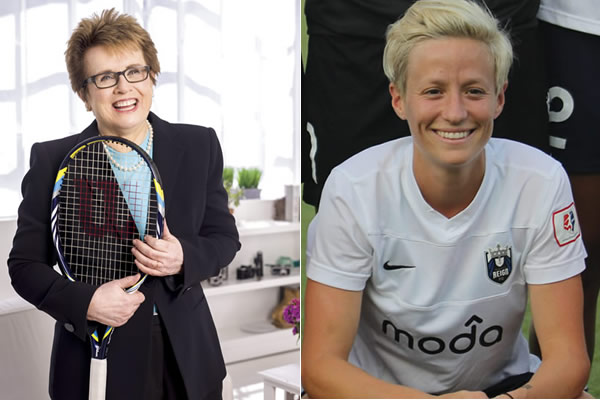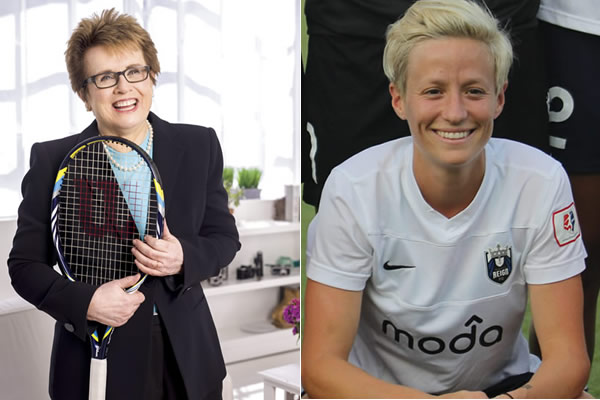

Lesbian athletes, including tennis legend Billie Jean King and World Cup champion Megan Rapinoe, were among the 176 women who signed a legal brief submitted to a federal appeals court Monday calling on judges to overturn an Idaho law barring transgender girls from participating in school sports.
The friend-of-the-court brief, coordinated by the LGBTQ group Lambda Legal, urges the U.S. Ninth Circuit Court of Appeals to rule against the law, HB 500, arguing school athletic participation “provides unparalleled opportunities to forge a sense of belonging, connectedness, and contribution.”
“The benefits of sports extend to all aspects of school and throughout life. But these benefits are diminished when some athletes are excluded because of who they are,” the brief says. “Amici’s experiences in sports and in life are a testament to the value of inclusion in building powerful teams and social, societal, and business institutions.”
The attention to the experiences of women athletes is key to the context of the 38-page brief, which is filed amid debate on whether transgender girls should be allowed in school sports.
Rep. Tulsi Gabbard (D-Hawaii), who had apologized for her anti-gay past during her presidential run, has introduced in her remaining days in Congress legislation that would amend Title IX of the Education Amendments of 1972 essentially to prohibit transgender girls from school athletics. In a subsequent video, Gabbard justified this legislation by saying biological males have inherent physical advantages over women and would compromise paths to victory and scholarships for non-trans girls.
King, who won the “Battle of the Sexes” match against Bobby Riggs in 1973 and was ranked the world’s number one ranked tennis player six times, said in a statement “there is no place in any sport for discrimination of any kind.” (King was ostracized after coming out as a lesbian in 1981 and lost an estimated $2 million in sponsorships.)
“I’m proud to support all transgender athletes who simply want the access and opportunity to compete in the sport they love,” King said. “The global athletic community grows stronger when we welcome and champion all athletes – including LGBTQI+ athletes.”
Other women athletes who signed the brief in the case, Hecox v. Little, are Candace Parker, who was trailblazer in women’s basketball; Phaidra Knight; a former rugby player who was a member of the United States National Team from 1999 to 2017; and Esther Lofgren is an American rower and an Olympic gold medalist. Athlete Ally and the Women’s Sports Foundation also roles in coordinating the brief.
Many of the same athletes also co-signed a letter to the National Collegiate Athletic Association in June urging the organization to nix all sporting events in Idaho in the wake of the anti-trans law. The NCAA, however, has yet to act in response publicly.
The case comes to the Ninth Circuit upon appeal after U.S. District Judge David Nye, appointed by President Trump in 2017, ruled in August against the Idaho law, conceding his order “is likely to be controversial.”
The Trump administration has participated in the case and filed its own friend-of-the-court brief before the Ninth Circuit in November urging the court to uphold the law. The efforts got a boost from President Trump himself, who retweeted a Brietbart on the U.S. Justice Department filings from his Twitter account.
Carl Charles, staff attorney for Lambda Legal said, in a statement the dozens of athletes who signed the brief have “a deep understanding and appreciation of the life-long benefits that come from participation in sports.”
“They recognize the value of inclusive and welcoming sports environments and firmly believe laws like HB 500 that single out groups of women and girls from participation in sports harm the entire athletic community,” Charles said.
Prior to the enactment of HB 500, the Idaho High School Activities Association already had in its rules a requirement limiting transgender athletes access to sports, requiring boys who transition to girls “complete one year of hormone treatment related to the gender transition before competing on a girls team.”
According to the Idaho Statesman, IHSAA says as of March 2020 it had “received just a couple of inquiries about Idaho’s policy and has fielded occasional calls about potential transgender athletes over the past five or six years, but so far, Idaho has not had an athlete use the policy.”